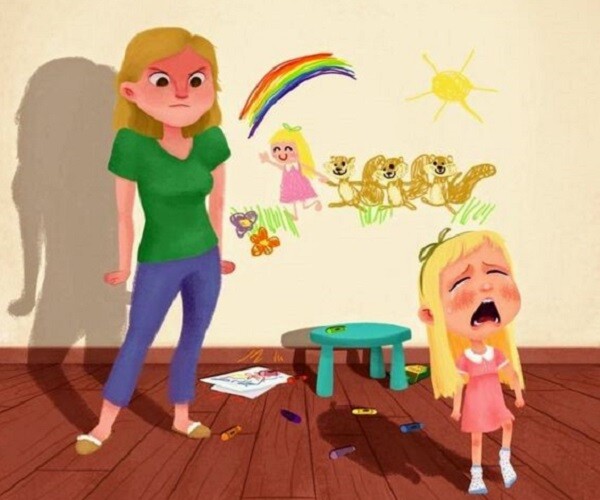As education expert Li Zhenxi says, The problems of children actually reflect the problems of adults.
And parents often use the following three sentences, unknowingly creating distance with their children.


You’re so stupid, you can’t even do such an easy assignment
‘Stupid’… This word seems to have become a ‘catchphrase’ for many parents. The initial purpose is to hope that the child will improve, but in fact, it ignores the hidden harm in their words.
The ‘barrel effect’ tells us that the amount of water a barrel can hold depends on the shortest piece of wood.
Similarly, when parents only focus on the shortcomings and reinforce them with negative words, they are inadvertently diminishing their child’s self-worth.
Calling a child ‘stupid’ makes them feel inadequate, unworthy, and incapable of achieving anything in life.

Russian educator Suhomlinsky once said, Each child is a seed of hope that needs to be carefully nurtured and watered.
This emphasizes that every child has their own unique potential and value.
It is the responsibility of parents to discover and cultivate these potentials instead of solely focusing on the shortcomings.
In the face of a child’s weaknesses, learn to look at them with gratitude and encouragement, rather than just seeking out faults. Discover their small improvements, praise them, and give them sincere affirmation.
When children feel recognized and supported, they will be more motivated to overcome difficulties and face challenges.

Look at how well your friend A is doing. Why don’t you follow their example?
See how Ming always comes first in class? Why can’t you be more like him?
Hong from next door is so considerate, and you don’t know how to care for your parents.
Most parents want their children to be well-behaved and understanding like other kids.
However, each child is unique, with their own characteristics and development pace.
When parents constantly use others’ strengths to demand more from their child, they are sending a message: In my eyes, you will never be as good as others. No matter what you do, it’s never enough.

Over time, children not only develop a sense of insecurity and disappointment but also envy.
Brandt, a renowned American family educator, pointed out that What children need is not perfection according to a mold but a unique self that is understood and accepted.
Therefore, parents are advised to learn to appreciate differences and embrace their child’s true self.
Discover their strengths, encourage their interests, and help them find a path that suits them.
When children feel that they are unique in their parents’ eyes, they will have more motivation and confidence to shine.

How many times have I told you? Why won’t you listen?
Put away your toys before going out.
Don’t stay out too late.
Finish your assignments on time, don’t procrastinate.
Every day, parents give their children countless reminders. However, when these reminders are repeated over and over, and the child still does their own thing, parents can’t help but explode:
How many times have I told you? Why won’t you listen?
In the face of this anger, children develop a rebellious mindset: Mom nags me every day, it’s so annoying!
The magazine ‘Psychology and Life’ once published an article arguing that when a behavior is reinforced too much, people will naturally resist.

When parents repeatedly complain, children typically feel annoyed and irritated, and then a sense of rebellion arises.
The famous psychologist Rogers once said, Instead of just lecturing, it’s better to listen to what the children have to say.
Learn to think about issues from their perspective and understand their feelings.
By listening more and teaching less, parents can better connect with their children’s hearts and build a stronger spiritual bond.
According to educator Suhomlinsky, A child’s mind is like a mirror, reflecting the image of their parents.
Often, a child’s rebellion and boredom reflect the missteps in their upbringing.
Therefore, instead of complaining about their child’s disobedience, parents should also reflect on their own words and actions.
Trust your children, value them, and be patient in listening to them. In this way, a child’s heart will open up, and the family relationship will become more harmonious.
When children grow up in a peaceful environment, receiving abundant love, they will mostly turn out healthy, knowing how to build a healthy and happy future for themselves. At that time, when parents look back, they will also feel the sense of responsibility, care, and love from their children.
“A Father’s Guide to Raising a Confident Daughter: 3 Things to Say to Your Little Girl”
A father’s influence on his daughter’s life is undeniable and plays a pivotal role in shaping her personality and future success. The way a father raises his daughter can empower her to become a confident and resilient woman. Alongside a mother’s nurturing, a father’s involvement contributes significantly to a daughter’s overall development and sense of self-worth.




































